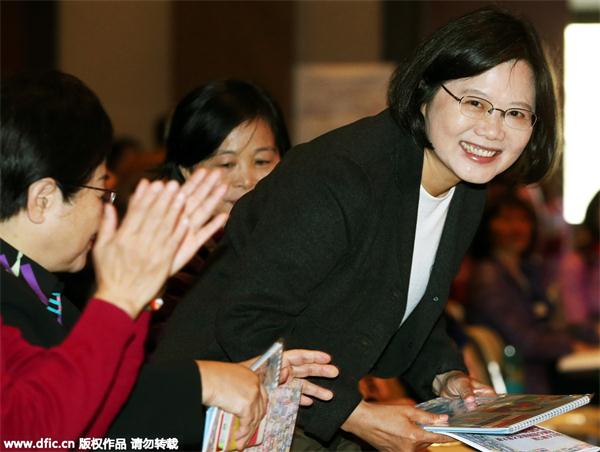 |
|
Tsai Ing-wen attends to the talent competition of children with mental disabilities in Taiwan. [Photo/IC] |
Taiwan leader Tsai Ing-wen, chairwoman of the ruling Democratic Progressive Party, once again refrained from elaborating on her cross-Straits relations policy while delivering a speech on Monday. Instead, she said that "our pledges and goodwill remain unchanged, but we will neither succumb to pressure nor revert to the old path of conflict and confrontation".
The same comments were made in a letter Tsai wrote to DPP members on Sept 29, in which she called the mainland a country for the first time and urged resistance against "pressure" from the other side of the Taiwan Straits.
In her speech on Monday, she told the mainland to "face up to the existence of the 'Republic of China'" and "respect Taiwan people's faith in democracy". She went on to suggest that both sides could talk about "anything in the interest of the peaceful development of cross-Straits ties and the livelihoods of people on both sides".
The truth is, Tsai is willing to talk about anything but the 1992 Consensus, and her "goodwill" is nothing more than a pie in the sky. In other words, the DPP leader does not want to face up to the reality there is only one China, and is intending to keep beating around bush in the vain hope of realizing her "pro-independence" ambitions.
Tsai's speech, which basically reiterated her previous political pledges, was not only an ill-designed attempt to test the limits of the mainland in regards to cross-Straits affairs, it was also intended to make the mainland a scapegoat of her missteps at home.
Tsai's recent moves stem from her misreading of the pendulum of cross-Straits relations, which she believes had swung in her favor. Backed by some senior Kuomintang members who served in the Lee Teng-hui administration and her DPP supporters, she has sought to create more political divisions in the island's officialdom.
Making more Taiwan politicians, be they DPP or Kuomintang members, acknowledge the existence of the "Republic of China", serves Tsai's pursuit of a bipartisan political consensus, and eventually the island's "independence". So do her efforts to tout Taiwan's "democracy", which she uses as an ideological weapon to attack the fact that both the mainland and Taiwan belong to one China.
According to China National Tourism Administration, only 7,915 mainland tourists visited the island during the weeklong National Day holiday starting on Oct 1, whereas the figure could easily exceed 10,000 a day in the past. That, of course, has something to do with Tsai's equivocation of the "status quo" of cross-Straits ties that existed under her predecessor.
But in the face of rising public rage on the island at the drop in mainland visitors, which has dealt a heavy blow to the island's economy, Tsai does not seem to be bothered at all. On the one hand, she has promised to attract more tourists from Southeast Asia to fill the void left by mainland tourists, by coining the so-called New Southward Policy. On the other hand, she is seeking to divert public anger toward the mainland, blaming it for "pressuring Taiwan".
It is fair to say much of her focus remains on affairs at home and making the island "a normal state" by cozying up to the United States and Japan rather than trying to fix relations with the other side of the Straits. But Tsai should drop her favorite trick of provoking the mainland before the island feels even more pain.
Zhu Songling is a professor at the Institute of Taiwan Studies, Beijing Union University. The article is an excerpt of his interview with China Daily's Cui Shoufeng.